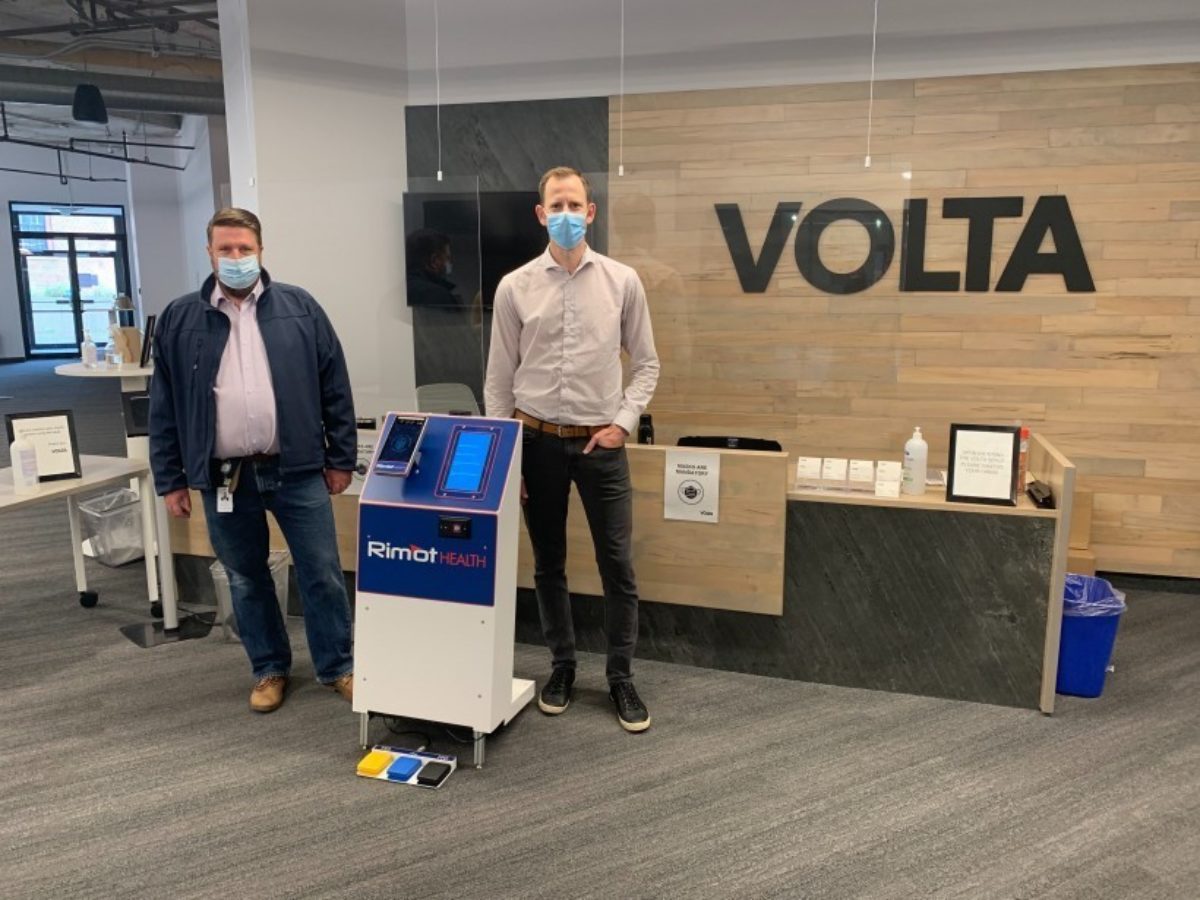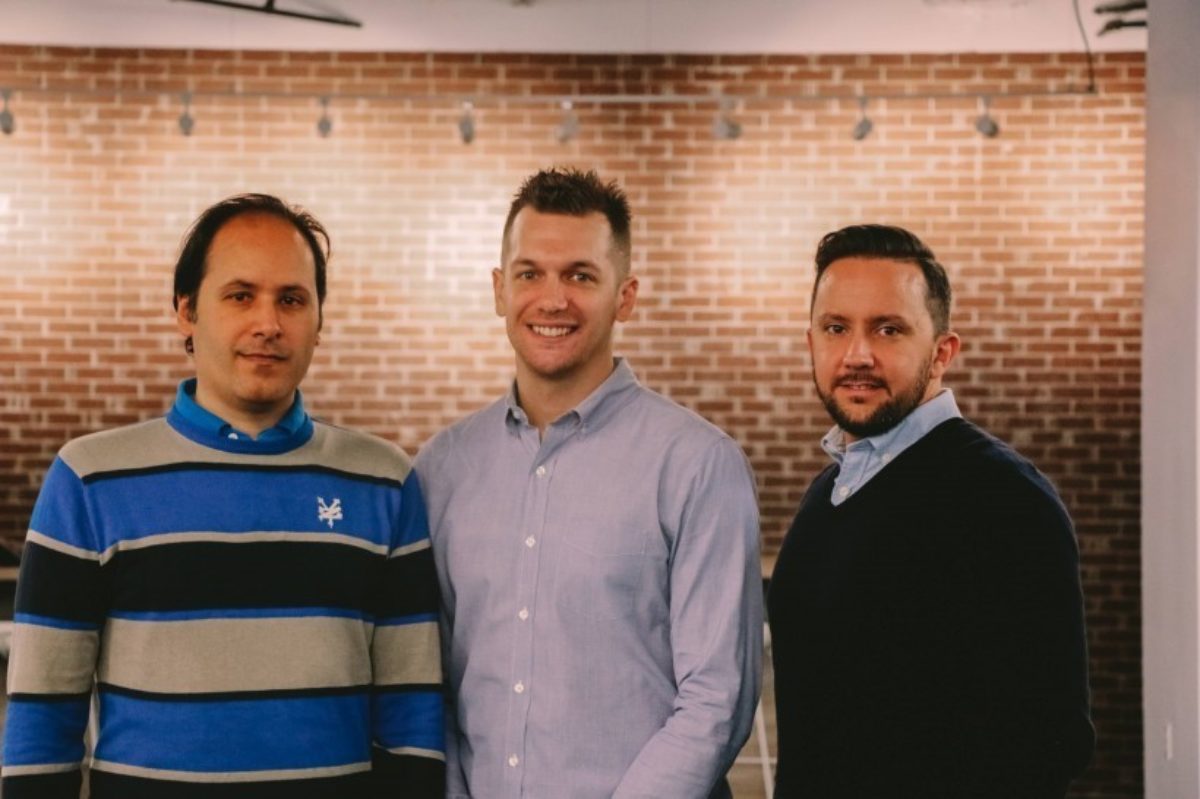Startups in Halifax Reach New Customers and Raise Funds
November 4, 2020
By Carol Moreira
In October, we saw partnerships and collaborations between startups, support organizations, and government continue to grow in Halifax’s Innovation District. Startups are expanding their reach to new customers, products, and markets and getting funding despite the pandemic.
Partnerships in the District and Beyond
First City as a Living Lab Initiative Launched
Halifax Partnership and Volta have become early adopters of a new device from Rimot.io that screens people entering workplaces for COVID-19.
Rimot’s monitoring technology helps organizations ensure that their infrastructure in remote locations is working. Their new product screens people for COVID-19 through a touchless thermal camera and automated questions. The product is called RimotHealth and the venture is working on sales across North America and Europe.

“We fast-tracked RimotHealth to provide contactless screening along with the real-time data and analytics for these business and government organizations to safely and cost-effectively manage in the new normal,” Rimot CEO Andrew Boswell said in a statement.
This is the first pilot project of the Halifax Innovation Outpost’s City as a Living Lab initiative, which aims to help startups beta test their products.
Last year, Rimot.io raised $1.2 million in equity financing. The startup is also developing a product called RimotShip, which uses data produced by a ship and artificial intelligence to improve a vessel’s onboard operations.
Tranquility Partners with Local Researchers
Tranquility Online, which offers web-based Cognitive Behavioural Therapy to individuals with anxiety and depression, has partnered with Maritime governments and researchers to investigate how the pandemic is impacting the mental health of caregivers and parents.
The research will assess the implementation and evaluation of e-mental health care on at least 200 participants.
Joel Muise, company Co-founder and CEO, said the move should “help generate evidence that Tranquility is effective at a large scale, working with a very important key audience – parents and caregivers.”
The work is funded by a federal research grant from the Canadian Institute of Health Research. The project will include translating the company’s program into French.
Volta Partners with Scale AI for New Program
Halifax innovation hub Volta has partnered with Scale AI, the Montreal-based artificial intelligence supercluster, in order to offer Volta AI, a new program which supports companies bringing AI to supply chains.
Five Canadian companies will participate in the one-year program which will provide them with funds to buy materials or services.
Applications are open until Nov. 23, and virtual program will start next year. Qualifying companies must be based in Canada and focus on applied AI and intelligent supply chains. Customers must be interested in or paying for their product or service.
As one of five national superclusters, Scale AI is supporting AI across Canada and has received $230 million from the federal government and $53 million from Quebec’s administration.
Funding Announcements
LifeRaft Closes Large Funding Round
Security intelligence company LifeRaft closed a funding round from the Canadian Business Growth Fund, or CBGF, thought to be worth more than $3 million. CBGF was the only investor and didn’t disclose how much was raised. But the company said the Toronto-based fund usually invests between $3 million and $20 million.
The money will be used for sales and marketing and development of its Navigator product, which alerts companies and organizations if online activity suggests a threat to its assets, employees or customers.
"We are extremely proud of the product and team we have built, which is helping to keep some of the most recognized brands around the world safe," said LifeRaft CEO John Gallinaugh in a statement.

LifeRaft started in 2014 with a technology that scanned social media to find words or phrases that suggested someone was contemplating a crime. It now has 52 employees and more than 100 blue-chip global clients in diverse industries.
In June, CBGF closed a funding round with Halifax’s Proposify, which simplifies and enhances the writing of proposals. The CBGF fund, which is backed by the biggest Canadian banks and insurers, now has two portfolio companies based in the District.
Feds Give $1.3 million Grant to Lab2Market
The Atlantic Canada Opportunities Agency has contributed $1.3 million to the Lab2Market program which aims to teach startup methodology to researchers across the country. The program is housed at Dalhousie University and also offered at Ryerson University and Memorial University.
“Canada needs innovators with an entrepreneurial mindset who have the attitudes, knowledge, skills, discipline and resilience to generate solutions to local, national and global challenges,” Dal Vice-President of Research and Innovation Alice Aiken said in a statement.
Based on successful programs in the U.S. and U.K., Lab2Market works with post-doctoral researchers and PhD candidates to determine whether their scientific discoveries can become viable startups.
Dalhousie will lead teams of students, researchers and advisers in developing and commercializing new ideas. Applications for the next cohort are open until November 20.
3D BioFibR’s Funding Enables Production of Natural Materials
3D BioFibR concluded a $550,000 funding round that will allow it to begin producing commercial volumes of nature’s “strongest, lightest and toughest” materials. The round included $100,000 from Innovacorp and $150,000 from Concrete Ventures.
The startup is led by Kevin Sullivan, a veteran of various life sciences companies and founder of Appili Therapeutics, and John Frampton who is the Canada Research Chair in Biomaterials at Dalhousie University.
Frampton has improved ways of producing biofibres - fibres that exist in nature and are used by humanity. They include collagen, the structural protein found in skin; chitosan, a substance found in shellfish shells; and spider silk, which spiders use in webs. These materials have many commercial applications and Frampton’s work allows them to be produced in industrial quantities at low prices.
“The physical, mechanical and chemical properties of these naturally occurring fibres could help solve many of the engineering challenges we face…Our 3D BioFibR team has solved the problem of making high quality biofibres using a proprietary, scalable process which is already at least 600 [times] more efficient than current technologies.”
Sullivan told Entrevestor that initial products will be in the biomedical space.
Expanding to New Markets and Customers
Fundmetric Signs Texas Tech
Fundmetric, a company which helps non-profits increase the money raised from philanthropists, has signed one of its largest clients to date: Texas Tech University. U.S. colleges and universities have become the startup’s main market.
“We always pride ourselves on going with clients that are pushing the boundaries in fund-raising, and Texas Tech is no exception to that,” Fundmetric Co-Founder and CEO Mark Hobbs told Entrevestor.
FundMetric’s product utilizes machine learning to maximize the money raised in fundraising campaigns. The product identifies donors, and tells them how their money is used and the impact it’s having, so encouraging giving.
Early in the pandemic, Fundmetric opened its Giving Page to Canadian charities. The company currently has 13 employees and has already doubled its revenues this year.
Trip Ninja pivots to focus on Travel Agent Market
Trip Ninja, a travel-planning software startup, has pivoted to concentrate on traditional travel agents. The company has reworked its software into a product named QuickTrip, to help agents find the cheapest routes for multi-city trips with custom options.
“What we’re doing here is distilling all those time-consuming processes, and now [travel agents] do it with one search on our technology,” CEO Andres Collart told Entrevestor. “This is a massive market, and it’s not a market that’s well-served by a technology company...There’s more of a pain there.”
A recent survey from the International Air Transport Association revealed that around 43 percent of travellers like to reserve flights via traditional travel agents. Another survey by magazine Travelweek found that around 57 percent of Canadians are likely to use an agent for future bookings in the hopes of receiving good customer support.

Collart said the company may raise funds in 2021. It currently has eight employees across Canada. A focus will be on making the new software available in different languages.
Appili Works on Biological Warfare Drug Candidate
Appili Therapeutics signed a manufacturing agreement for one of its drug candidates that might result in a vaccine for use in biological warfare.
The company is working with Florida-based Ology Bioservices to produce Appili’s candidate ATI-1701. Ology recently received US$6.3 million (C$8.3 million) from the U.S. Dept of Defense to develop and make the drug.
It’s intended that ATI-1701 be used to vaccinate against tularemia, an infectious disease that attacks the lymph nodes, lungs, eyes and skin. The illness is caused by the bacterium F. tularensis, which is named a Category A pathogen by the U.S. National Institutes of Health, meaning it poses the highest level of risk.
In a statement, Appili said F. tularensis is 1,000 times more infectious than anthrax, leading experts to think the aerosolized form is likely to be used in bioterrorism.
“Tularemia is a potentially deadly biological weapon for which there is no approved vaccine,” Appili CEO Armand Balboni said in a statement. “ATI-1701 has the potential to address this critical biodefense gap…”
Appili develops drugs that fight infectious diseases and is currently working on three other candidates.
Earlier this year, Appili raised a total of $27 million in two private placements on the TSX Venture exchange, and it announced last month that it is moving to the main board of the Toronto Stock Exchange.
ReelData Lands Major Client and Wins US$50,000
ReelData AI, a startup that uses AI to improve production in fish farms, added Denmark’s Atlantic Sapphire to its client list and won a US$50,000 cash prize from the MassChallenge accelerator in Boston.
The prestigious MassChallenge accepted 100 participants from 12 countries into its 2020 cohort. ReelData was one of eight ventures to receive a gold prize worth US$50,000 and the only Canadian winner.
ReelData’s software analyzes video from inside aquaculture tanks to assess the biomass and health of fish stock and ensure fish are receiving the right amount of food.
The company’s technology will also be used at Atlantic Sapphire farms in the U.S., including the massive land-based fish farm Bluehouse plant in Florida.
“The land-based industry has really taken off,” CEO and Co-founder Matt Zimola told Entrevestor. “It’s set to grow really rapidly so we’re mainly looking at partners with land-based fish farms.”
Land-based fish farms are widely considered more sustainable because fish aren’t exposed to sea lice and waste does not pollute coastal waters.
Bright Signs Saint Mary’s
Bright (formerly CribCut) signed the Saint Mary's University Students' Association as a client for its online well-being platform, Bright Pass. The startup offers online wellness services to groups whose members or staff are working remotely. Other clients include Proposify and the Nova Scotia Health Authority. SMU is the first university to enable its students to access Bright’s health and wellness programming, which offers a variety of live online wellness classes.
“Self-care is often thought of as a luxury, but we firmly believe it's a priority, especially in high-stress times like we're facing today,” said Bright Co-founder and CEO David Howe in a statement.

More News and Events in the District
Health Challenge Pitch Awards WeUsThem $100,000
WeUsThem Inc. won the second Health Challenge Pitch Event, which focused on mental health. The advertising agency won with its product imTeen, which allows youth to self-monitor for signs of common mental and physical illnesses. The company won $100,000 and the opportunity to have its technology adopted by the Nova Scotia Health Authority.
During the presentation, NS Health said it has boosted virtual provision of mental health services during the pandemic. The increased emphasis on online care has allowed NS Health to continue providing services.
Three other companies presented, including Tranquility Online and Dispension Industries whose MySafe kiosk allows authorities to distribute opioids to registered users in a controlled manner, with the aim of preventing overdoses.
The organizing partnership includes BioNova, QEII Foundation, and the Atlantic Canada Opportunities Agency.
Digital Nova Scotia Awards Recognize Diversity
Five Digital Diversity awards were awarded by IT industry association Digital Nova Scotia to recognize contributions to diversity and inclusion in Nova Scotia’s tech sector.
The awards began in 2016 to recognize female leaders. In 2020, the expanded awards highlight other ways that diversity is enabling innovation.
“Diversity drives innovation, which is essential to the continued success of the tech sector,” Digital Nova Scotia CEO Wayne Sumarah said in a statement.
The winners are:
- Diversity and Inclusion Champion: Mi’kmaw Economic Benefits Office MEBO aims to maximize the employment and contract opportunities for indigenous people in Unama’ki (Cape Breton).
- Shaping the Future: Techsploration This program helps young women in Grades 9 through 12 explore engineering, science, technology and trades as occupations.
- Next Generation Leadership: Mrugakshee Palwe, CEO, Atlantic Blockchain Company As the co-founder of Atlantic Blockchain Company, Palwe is accelerating the adoption of blockchain and cryptocurrency through education.
- Fueling the Digital Economy: Jennie Sanford, Head of Operations, Proposify Sanford has been an integral part of encouraging empathy and inclusion at Proposify, a company that facilitates the process of writing proposals.
- Change Maker:Akram Al-otumi Al-otumi is Director of ShiftKey Labs, and a lecturer in technology, innovation and entrepreneurship at Dalhousie University. He is also CEO and Founder of Spritely Technologies.
Carol Moreira is a Principal of Entrevestor, which provides news and data on Atlantic Canadian startups.